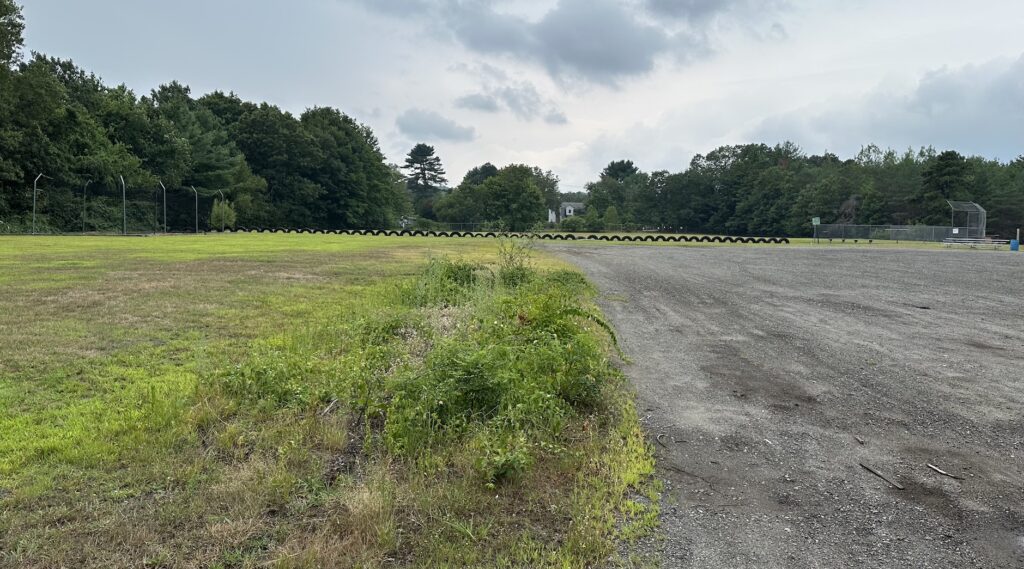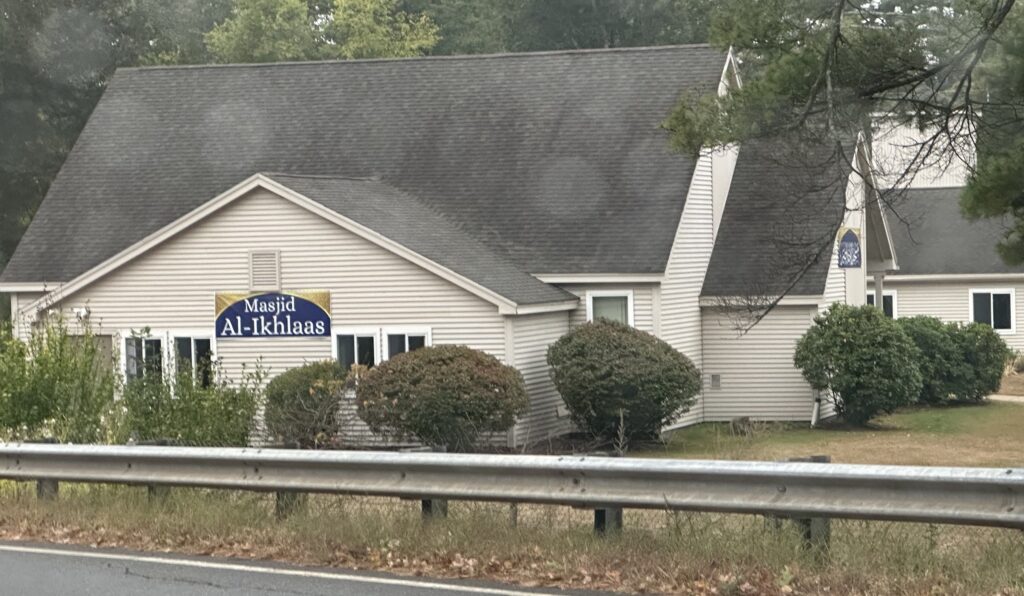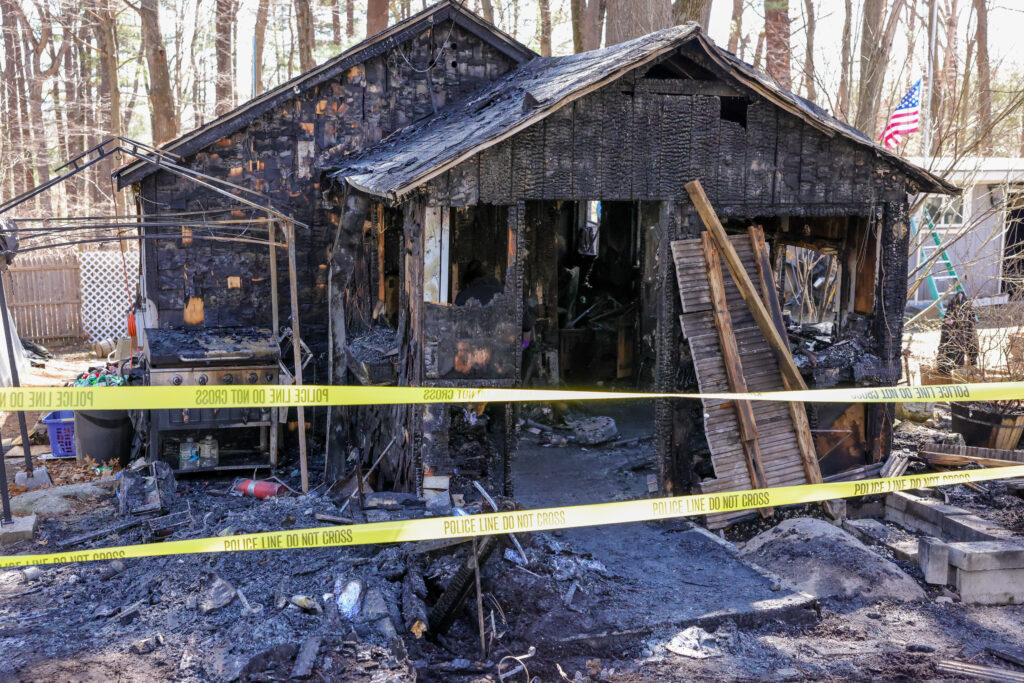The Select Board at its meeting Tuesday night heard about the weed management plan for Lake Maspenock, which includes the use of two herbicides.
Department of Public Works Director Kerry Reed appeared before the board with Joe Baldiga, the chair of the Citizens Input Group (CIG) that has been providing annual weed surveys since 2016.
Reed gave a presentation on the history of the situation from the creation of Lake Maspenock, a man-made lake, by a dam installation in 1834 to the creation of a weed management “toolbox” in 2022. It was similar to her presentation to the Conservation Commission on March 12.
She indicated that that the town purchased the dam in 2006, spurring the town’s interest in lake management. Select Board chair Muriel Kramer noted that the purchase price was $1.
“In 2015, as part of the plan for lake management, Public Works went to Town Meeting with an annual operating budget that included the use of herbicide treatment,” Reed continued. During Town Meeting, she said an amendment was proposed that switched the proposed funding for herbicide use to the creation of a lake management plan.
A second amendment called for the Select Board to manage this plan. The Select Board in 2015 created the Lake Maspenock Citizens Advisory Group (also known as the Citizens Input Group or CIG). The CIG’s function was to put together a comprehensive weed management control plan. Annually, the CIG preforms a weed survey with the expertise of a certified limnologist.
In 2020, the Conservation Commission denied the DPW’s notice of intent to use herbicide, instead seeking alternatives for a “toolbox.” The toolbox was approved in 2022, and it included an extended lake drawdown every three years and benthic barriers.
At its most recent meeting, the Conservation Commission approved the use of two herbicides at Lake Maspenock in a 6-0-1 vote, with chair Jeff Barnes abstaining. The regular drawdowns of the lake still will occur.
Reed said the weeds have grown “in density and diversity” over the years. She explained that the two herbicides that will be used are Tribune (diquat) and Aquathol-K (endothall), which dissipate quickly. Targeted application is expected to begin in early June to the northern basin, north of Sandy Beach up to West Main Street. This is where the weed growth has been most extensive. It will be a spot treatment of no more than 50 acres. There will be a public awareness campaign beforehand to alert residents.
During the public comment period, most residents of the Lake Maspenock area strongly supported the targeted application of herbicides to control the overgrowth.
Baldiga added that all options in the toolbox have been explored. The mechanical harvesting method has been deemed “not feasible” in the northern basin.
“We’re not coming to you looking for a vote,” he said. “We want your support, or at least a recognition that this is a problem.”
Member Irfan Nasrullah asked how the herbicide would be applied. Reed explained that it would be applied at the bottom of the weed with a wand to prevent photosynthesis. Baldiga added that there would be “a couple of gallons” used per acre.
Said Baldiga: “We wouldn’t be going through all this if we didn’t think it’ll be effective.”
Member Amy Ritterbusch said her concern is that residents would not be able to use the lake for boating, fishing or swimming for seven days after the herbicide application. There will be public outreach via signs and traditional and social media, Baldiga said.
She also suggested a discussion about fertilizer restriction, as some of the water that flows from School Street houses into Lake Maspenock. Kramer said this item will be placed on a future agenda.
Members agreed that the use of herbicides, while not ideal, is appropriate in this limited instance.
Police chief’s midyear review postponed
The midyear evaluation of Hopkinton Police Department Chief Joseph Bennett was pushed to the next Select Board meeting on April 2 because the chief was unable to attend. Kramer noted that the chief informed her shortly before the meeting of his impending absence. Bennett shared with Kramer an update on the police hiring process, which was discussed in greater detail later in the meeting.
“We will need to speak to this issue next week,” said Kramer. “But it is our hope that the chief will be here when we do.”
Town’s FY 23 audit report shows ‘very healthy year’
Certified public accountant Terenzio Volpicelli told the Select Board that an audit of the town’s financial statements for fiscal year 2023 led to a “clean or unmodified audit opinion” issued on March 11. This indicated a “very healthy year.”
This is the first audit that will take place as part of a three-year contract, he added. The 60 pages of financial statements revealed that revenues exceeded the budget by $5.6 million. Expenses came in under budget.
Volpicelli added that the town has $5.4 million in unspent American Rescue Plan Act (ARPA) funds that need to be “fully obligated” by the end of the year via a purchase order or a contract. The town has two years from Dec. 31, 2024, to expend the funds.
Coming into FY 24, the certified free cash totaled $9.6 million, while the general stabilization fund had $4 million.
Departments invest in cross training employees
New Town Treasurer CJ Paquette and Chief Financial Officer Kyla LaPierre presented the quarterly deposit and investment report for the first quarter of the fiscal year. They intend to have these quarterly reports presented more quickly in the future as the departments coalesce.
“It’s a very good story,” said Paquette, noting the town earned $1.7 million in interest.
Paquette and LaPierre each stressed the importance of the cross training that the recent hires are receiving. LaPierre noted that in the past, there was a “key dependency on single people.” Cross training allows everyone to have some knowledge of different roles so there won’t be significant gaps if these areas ever become short-staffed again.
“It’s great now that we have formed a new team, ready to go,” said vice chair Shahidul Mannan.
Hiring processes moves forward
Town Manager Norman Khumalo announced that Community Paradigm was the contractor selected to manage the hiring process for the new permanent town manager. Representatives will appear at the next Select Board meeting.
Regarding the HPD, applications “have been coming in” for the deputy chief position. Interviews have been held for the lieutenant position, as well as assessments by Bennett.
A consultant is being reviewed to help with the deputy fire chief search.





















The Independent fails to mention the Hopkinton Sustainable Green Committee’s representatives testimonies opposing the unsustainable, ecologically harmful use of chemical herbicides in Lake Maspenock as fiscally and environmentally irresponsible.
The committee supports a non-toxic, long-term, holistic plan incorporating limiting watershed nutrient loading, barrier plants, benthic barriers, draw down, hand pulling, and mechanical plant management as detailed in the Lake Maspenock Aquatic Vegetation Control & Water Management Plan (June 2021). Federal and state aquatic science studies show the use of toxic herbicides is a short term method and results in a herbicide treadmill of future use of toxic chemicals which harm the lake’s web of life. The planned June 6 application of hundreds of gallons of the herbicide diquat, a herbicide banned in Europe because it harms aquatic life and human health, and endothall, the EPA says harms mammals, and the potential of PFAS in the herbicide inert formulations are clear reasons to ban the use of toxic aquatic herbicides. Donald Sutherland, Chair of the Environmental Working Group, Hopkinton Sustainable Green Committee